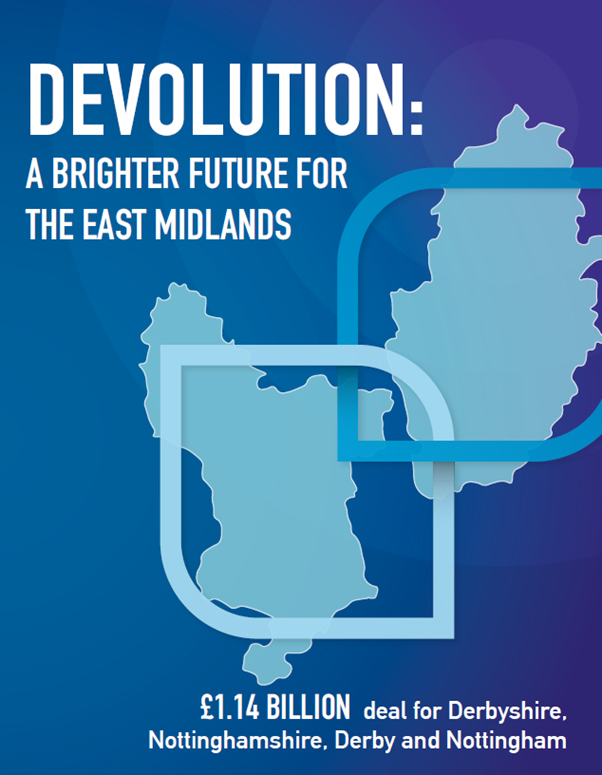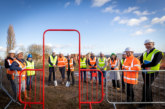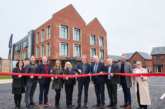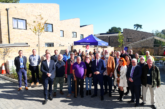
The Government has confirmed that a £1.14bn devolution deal is on offer for the East Midlands, covering Derbyshire, Nottinghamshire, Derby and Nottingham.
The deal will provide the region with a guaranteed income stream of £38m per year over a 30-year period. Covering an area home to around 2.2 million people, an East Midlands combined authority would be one of the biggest in the country.
All four city and county council leaders in Derbyshire, Nottinghamshire, Derby, and Nottingham have signed up to work on this devolution deal with the government.
Barry Lewis, Leader of Derbyshire County Council, Ben Bradley MP, Leader of Nottinghamshire County Council, Chris Poulter, Leader of Derby City Council, and David Mellen, Leader of Nottingham City Council, met with Greg Clarke MP, the Secretary of State for Levelling Up, Housing and Communities, on Tuesday 30th August at Rolls Royce in Derby, where the leaders agreed to the devnetolution deal in principle.
The councils will work on the details of the deal and each council will take a report to approve a more detailed proposal for a consultation later this year, so that residents, businesses, and other organisations can have their say.
The deal is one of the first of a new type of combined authority, requiring new legislation from central government. As well as the £1.14bn, it includes an extra £16m for new homes on brownfield land, and control over a range of budgets like the Adult Education Budget, which could be better tailored to the needs of people in our communities.
The devolution deal is a level 3 deal, which offers the most local powers and funding. It would mean a new elected regional mayor, like those in other areas such as the West Midlands and Greater Manchester, who would represent both cities and counties. The role of the mayor would be to look at major issues affecting the whole region, give the area more of a voice, and take advantage of local knowledge and expertise.
The deal means that a future mayor and combined authority could:
- Work towards Net Zero and cleaner air with new low carbon homes, retrofit existing houses with external wall insulation, promote the use of renewable energy, and protect and enhance green spaces, such as areas for wildlife and green verges.
- Build on the region’s existing knowledge and expertise in green technology and promote the growth of a future low carbon economy by investing in related skills training at colleges and other training facilities.
- Set up and coordinate smart integrated ticketing and enhanced concessionary fares schemes.
- Work with Homes England to build more affordable homes, by using new powers to buy land and housing (with district and borough council consent).
- Enhance the region’s economy by developing new commercial space to maximise opportunities. Work with national government on initiatives to address homelessness, domestic abuse, community safety, social mobility, and support for young people.
- Take advantage of economies of scale by using combined and devolved budgets to deliver more value for taxpayers and more cost-efficient services.
In a joint statement, Ben Bradley MP, Leader of Nottinghamshire County Council, Barry Lewis, Leader of Derbyshire County Council, Chris Poulter, Leader of Derby City Council, and David Mellen, Leader of Nottingham City Council, said: “We welcome the £1.14bn devolution deal from the Government on offer for our region. It’s fantastic news.
“We want to make the most of every penny so this can be used to make a real difference to people’s lives.
“As Leaders, we have all fought for a fairer share for our cities and counties, and a bigger voice for our area, to give us the clout and the influence we deserve, and to help us live up to our full potential.
“This deal would help make that a reality, creating more and better jobs through greater investment in our area, with increased economic growth, better transport, housing, skills training, and an enhanced greener environment, as we move towards being carbon neutral. These are what we all want to see, and we will work together for the common good of the East Midlands.
“We haven’t always had the same level of funding or influence as other areas, which has held us back. This is a golden opportunity to change that and put the power to do so in our own hands.
“There is a lot still to be agreed, and this is the beginning of the journey, not the end. We’re determined to build on this deal over time, as other areas have done.”
Greg Clarke MP, the Secretary of State for Levelling Up, Housing and Communities, commented: “Today is a momentous one for the people of Derby, Derbyshire, Nottingham, and Nottinghamshire as we sign our landmark devolution deal, placing power and funding it into the hands of the local leaders who know their areas the best.
“Devolving powers away from Whitehall and giving local leaders the resource to determine their own destiny is at the heart of our levelling up agenda and this devolution deal does exactly that.”
The four councils sent initial proposals to negotiate a combined devolution deal back in March, after being named as pathfinder areas by the Government in February and then being invited to apply for a devolution deal. The councils have been working with the Government to develop details of the deal, alongside discussions with district and borough councils, businesses, and other stakeholders.
If the devolution deal is formally approved, the Government will pass legislation bringing a new combined authority for the East Midlands into existence. The first election for a regional mayor for Derby, Derbyshire, Nottingham, and Nottinghamshire, would then be in May 2024.
The regional mayor would lead the new combined authority, which would also include representatives from local councils, with decision making powers and resources moving from London to the East Midlands.
This would not mean scrapping or merging local councils, which would all continue to exist as they do now and would still be responsible for most public services in the area. The mayor and combined authority would instead focus on wider issues like transport, regeneration, and employment across both cities and counties.
Devolution is backed by the East Midlands Chamber of Commerce, the East Midlands D2N2 Local Enterprise Partnership, the University of Derby, Nottingham Trent University, and the University of Nottingham.








